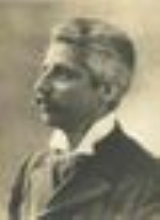
Duarte Leite
Encyclopedia
Duarte Leite Pereira da Silva, GCC
(Porto
, 11 August 1864 - Porto, 29 September 1950; duˈaɾt(ɨ) ˈlɐjt(ɨ), was a Portuguese
historian, mathematician, journalist, diplomat and politician. He graduated in Mathematics at the University of Coimbra, in 1885. He taught at the Politecnic Academy of Porto, from 1886 to 1911. Meanwhile he was also the director of the newspaper diary "A Pátria". As a historian, he published many studies, later compiled in "História dos Descobrimentos" (History of the Discoveries), in 2 volumes.
After the overthrow of the Portuguese monarchy in 1910, he was Minister of Finance during the Augusto de Vasconcelos
government (1911–1912), and succeeded him, as Prime Minister and Minister of Internal Affairs, from 16 June 1912 to 9 January 1913.
From 1914 to 1931 he served as Portuguese ambassador to Brazil. He was a candidate to the Presidency of the Republic in the elections held in the Congress of the Republic, in 1925. Faithful all his life to his left-wing republican principles, he became a member of the 1945-48 Movement of Democratic Unity
, which during its brief lifespan functioned as the first form of legalized opposition to Salazar
's far-right Estado Novo (New State) regimen.
Order of Christ (Portugal)
The Military Order of Christ previously the Royal Order of the Knights of Our Lord Jesus Christ was the heritage of the Knights Templar in Portugal, after the suppression of the Templars in 1312...
(Porto
Porto
Porto , also known as Oporto in English, is the second largest city in Portugal and one of the major urban areas in the Iberian Peninsula. Its administrative limits include a population of 237,559 inhabitants distributed within 15 civil parishes...
, 11 August 1864 - Porto, 29 September 1950; duˈaɾt(ɨ) ˈlɐjt(ɨ), was a Portuguese
Portuguese people
The Portuguese are a nation and ethnic group native to the country of Portugal, in the west of the Iberian peninsula of south-west Europe. Their language is Portuguese, and Roman Catholicism is the predominant religion....
historian, mathematician, journalist, diplomat and politician. He graduated in Mathematics at the University of Coimbra, in 1885. He taught at the Politecnic Academy of Porto, from 1886 to 1911. Meanwhile he was also the director of the newspaper diary "A Pátria". As a historian, he published many studies, later compiled in "História dos Descobrimentos" (History of the Discoveries), in 2 volumes.
After the overthrow of the Portuguese monarchy in 1910, he was Minister of Finance during the Augusto de Vasconcelos
Augusto de Vasconcelos
Augusto César de Almeida de Vasconcelos Correia, GCSE , better known as Augusto de Vasconcelos was a Portuguese surgeon, politician and diplomat.-Career:...
government (1911–1912), and succeeded him, as Prime Minister and Minister of Internal Affairs, from 16 June 1912 to 9 January 1913.
From 1914 to 1931 he served as Portuguese ambassador to Brazil. He was a candidate to the Presidency of the Republic in the elections held in the Congress of the Republic, in 1925. Faithful all his life to his left-wing republican principles, he became a member of the 1945-48 Movement of Democratic Unity
Movement of Democratic Unity
The Movement of Democratic Unity was a quasi-legal platform of Portuguese democratic organizations that opposed the dictatorial regime of António Oliveira Salazar and was founded in October 1945....
, which during its brief lifespan functioned as the first form of legalized opposition to Salazar
António de Oliveira Salazar
António de Oliveira Salazar, GColIH, GCTE, GCSE served as the Prime Minister of Portugal from 1932 to 1968. He also served as acting President of the Republic briefly in 1951. He founded and led the Estado Novo , the authoritarian, right-wing government that presided over and controlled Portugal...
's far-right Estado Novo (New State) regimen.

